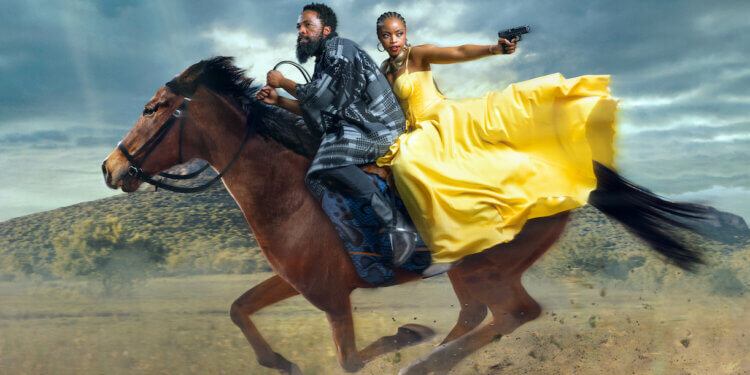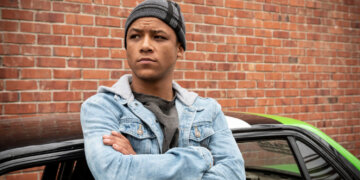Who would’ve thought a show about cattle rustling could be so thrilling? Certainly not this reviewer. Created by Tshedza Pictures’ Phathutshedzo Makwarela and Gwydion Beynon – behind hits like The River and The Republic – Showmax series Outlaws follows two warring families: the Zulu cattle farming Biyelas and the Basotho cattle-raiding Ts’eoles, essentially, the yin and yang of modern-day country-western Southern Africa. The first episode is a near masterpiece in television foundation; this was written by the seasoned and accomplished scribe Chris Q. Radebe, known for Shaka iLembe, The Queen, and The River, among other South African shows.
Outlaws begins by explaining the gold standard of this world, cattle, in a scene where the Biyela eldest son, Bandile, has to swim across a river to retrieve the herd he left somewhere in the field. It’s as dangerous as robbing a national bank, and when he brings back the cattle safely, he’s a hero.
Everything in this show glows. South African cinematographer Ntobeko Dlamini is also the man who shot the aforementioned Tshedza Pictures projects. Despite popular opinion and detraction, I admire it when a company of actors, directors, cinematographers and grips stick together across multiple projects. They become an artistic family, they have harmony, and more often than not, their work together only gets better and better. The lighting on Outlaws is on a level I only see from South Africa as far as film production in the continent goes.
As a Western, this show works perfectly fine. There are traces of spaghetti in it like the dramatic hat tilts to the accompaniment of a high-pitch instrument and one or two grimy close-ups here and there. It mostly plays it entirely straight, like a western western. This fits the fabric of the story well, which is good versus evil, on a surface level. It brings to mind old television westerns that used to get syndicated for several seasons, which is also what I suspect this show is going for. Those old serialized shows had a one-story one-episode template, fitting for the age of network TV. Outlaws is very much altogether another beast, a creature of its time. It ceases to be good versus evil after episode three, when every character gets a shine in the light, so to speak, a peek into their souls, which is why I felt stupid at my surprise that writers known mostly for telenovelas had birthed a Western that quickly begins to feel like…a telenovela.
The story begins to become a little routine as the episodes progress. Sigh. Nirvana Nokwe-Mseleku plays the female lead, Sihle Biyela, a doctor about to be engaged to a nice guy, but is subsequently driven to sexual madness by a stranger with (an accordion?) who also happens to be the leader of the gang who stole her family’s cattle and killed her parents. I don’t mean to be a downer, but in this case, I ardently do not want love to prevail. Shoot Cupid down with a rifle. I’ll get to this in a bit. The local Bob Dylan, Leruo Ts’eole, has a psycho for a brother named Tlali, who reminds us of his name every chance he gets. I hate this character Tlali. I hate him physically. I hate every word he speaks, his looks, and I even imagine hating his smell. A fantastic performance by Keketso Mpitso; exceptional and near perfect. The best villains in all the Westerns are big dumb and loud SOBs, and they don’t come any louder or dumber than Tlali.
Thembinkosi Mthembu plays Bandile Biyela, a similar character to his Shaka iLembe prince Dingiswayo, and he’s great in this role too. Bandile is a virtuous hard worker forced to become the leader of his family and head of the farm after his parents are murdered during a cattle raid. Mmabatho Mogomotsi plays the matriarch of the cattle-raiding Ts’eole family. She’s frail in the role, and this physicality doesn’t suggest a weathered past or a noble dignity; it only emits weakness that makes her character difficult to buy. Lehlohonolo Mayeza plays Leruo, the accordion-carrying heart-throb in a romance that completely went over my head. Remember, this is a telenovela disguised as a Western. Okay, fine, it’s both. Still—there’s no straight divide between good guys and bad, so Leruo gets as much development and sympathy as any of the Biyelas. Either his character or his acting doesn’t work, because I had no problems with him before he’s turned into Romeo, and suddenly Sihle, a woman with an honestly more impressive man by her side, masturbates to his voice on the other end of the line. Nirvana Nokwe-Mseleku is faultless in all of this, of course. As Sihle, she carries the absurdity of the situation with more grace than I considered possible. Her first appearance on Outlaws is of her naked, either pre or post-coitus, with her fiance Kwanele Dlamini (Mnqobi Kunene). Nirvana’s innocence has the same misleading allure of Maggie Gyllenhaal; her face says church but her thighs speak for the devil himself. She’s the only sensual presence in the show, besides the more prim Nandi Biyela (Nolwazi Shange), wife to Bandile and protector of his interests.
All in all, Outlaws is a show that will entertain many, and dazzle fans of telenovelas but bore those of Westerns. It’s a wonderful way to get into either genre, though, being so easily marred with others. I enjoyed it most in the beginning, but I enjoyed it still throughout the eight episodes that had been released at the time of this writing.
Outlaws is available to stream on Showmax.











